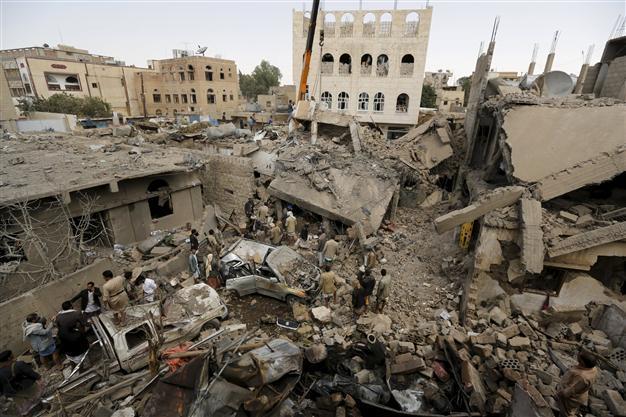Suspected Saudi-led air strike kills 13 at Yemen wedding
SANAA - Agence France-Presse

People gather at the site of a Saudi-led air strike in Yemen's capital Sanaa September 21, 2015. Reuters Photo
A suspected Saudi-led air strike killed at least 13 people at a wedding in a rebel-held town in Yemen, witnesses and the rebels said Oct. 8, even as UN peace efforts made headway.
There was no immediate comment from the Saudi-led coalition, which has come under mounting criticism from human rights groups for the civilian death toll from the bombing campaign it has waged against the rebels since March.
It was the second alleged coalition strike on a Yemeni wedding party in just over a week.
The new raid hit a house where dozens of people were celebrating the wedding on Oct. 7 evening in the town of Sanban, 100 kilometres (60 miles) south of the capital Sanaa, residents said.
"Coalition warplanes launched the attack. The house was completely destroyed," said witness and local resident Taha al-Zuba.
"Warplanes were heard in the area ahead of the attack."
The rebels' Al-Masirah television said on Twitter that the wedding was hit by "aggression warplanes," referring to the coalition.
Medical sources said 38 people were also wounded.
In September a suspected coalition strike killed at least 131 civilians at a wedding near the Red Sea city of Mokha, which the UN said may have been the deadliest hit since March. The coalition denied involvement.
The latest strike came as the United Nations announced that the rebels, who control the capital and much of central and northern Yemen, had accepted a UN Security Council resolution calling for an end to the seven-month conflict.
The rebels' refusal to agree to abide by the resolution passed in April -- demanding their withdrawal from all the territory they have seized since they overran the capital in September last year -- had stymied previous peace efforts.
Yemeni President Abedrabbo Mansour Hadi, who fled into exile in neighbouring Saudi Arabia in March but whose forces have since recaptured much of the south with the support of Saudi-led ground troops, had refused to join UN-brokered peace talks until the rebels signed up.
But UN spokesman Stephane Dujarric announced in New York late on Oct. 7 that both the rebels and their allies had confirmed they were willing to enter talks based on the UN resolution.
"This is an important step," he said.
The Shiite Huthi rebels, whose heartland is in the mountains of the far north, were only able to capture so much of the country because of the support of renegade troops still loyal to Hadi's ousted predecessor Ali Abullah Saleh.
Saleh's General People's Congress party too announced on Oct. 7 that it had accepted the UN peace plan following secret talks with UN envoy Ismail Ould Cheikh Ahmed.
Ould Cheikh Ahmed "believes that the government of Yemen, the Huthis and their allies should accept the invitation to join peace talks on this basis," Dujarric said on Oct. 7.
Human rights watchdogs have repeatedly criticised the Saudi-led coalition's air strikes in Yemen, saying they have hit areas without any military targets.
In late August, an air strike hit a bottled water factory in the northern province of Hajja, killing 17 civilians and 14 rebels.
Warplanes in July struck staff residences at a power plant in the Red Sea port of Mokha, killing 65 civilians, while an April raid on a dairy plant in the port of Hodeida further north left 35 civilians dead.
The rebels too have come under heavy criticism from human rights groups for "indiscriminate" shelling of civilian-populated areas.
A Western-backed resolution calling for a UN investigation into abuses committed during the conflict in Yemen was withdrawn due to protests from Saudi Arabia, Human Rights Watch said last week.
The UN human rights council announced on September 30 that the Dutch text had been withdrawn and that the draft set for adoption on October 2 was a Saudi proposal which did not include a call for an inquiry.
"It's truly a missed opportunity," said Philippe Dam of HRW. "What explains it? It was Saudi Arabia's total opposition" to the Dutch text.
The United Nations says around 5,000 people have been killed in the conflict in Yemen over the past seven months, many of them civilians.
